Education
Does Technology Make You Smarter Than You Think?
A conversation with Clive Thompson, author of Smarter Than You Think
Posted November 24, 2013

Bill Keller of The New York Times has said Twitter is “the enemy of contemplation.” Yet tech journalist Clive Thompson thinks ever new technologies, although sometimes distracting, on net have made us much smarter because we are social beings and a great deal of our thinking occurs outside our minds.
Thompson, an avid reader of ancient books from Project Gutenberg and a writer of magazine articles for over fifteen years, was a member of the Canadian League of Poets, plays guitar in a band: The Delorean Sisters, and had to avoid his Xbox to get his book written. And it is his appreciation and understanding of history that allows him to provide deep insight into how many technologies have come and gone, often improving our lives in many ways. As you will see, Clive has a delightful way of playing with words and telling stories, and his writing and speech reflect his love of literature and poetry. Through his many articles on the role of technology in our lives, he provides captivating stories and arguments that make for a very entertaining and thought provoking read.
On the cover of his book, engraved on the front and side, are Smarter Than You Think_ and CT_. What appear to be cursors following the text suggests the story isn’t over, that technologies will continue to change and so doing will change us, in ways that we don’t know, but mostly for the better.
There are 11 parts to this interview:
- Have New Tools Amplified Our Intelligence?
- Do Only Younger Generations Adopt New Tools?
- Knowing When To Use “Fast” Versus “Slow” Technologies.
- Are Brain Games Bogus When It Comes To Raising Smarts?
- 90 Percent Of Everything—Even Internet Writing—Is Crap?
- Are We Trading Some Literacies For Others?
- Are We Losing Older And Perhaps Wiser Ways Of Innovating?
- How Will Our Google-Drenched World Affect Our Creativity?
- Does The Flynn Effect (Rise In IQ) Mean We Are Actually Getting Smarter?
- Video Games Are The Gateway Drug To Learning
- Is Music Connected To Writing?
Have New Tools Amplified Our Intelligence?
JON: You mention how in freestyle chess, players who could work effectively with computers suddenly were able to beat giants who relied on their minds alone. This suggests an increase in performance but not necessarily an increase in actual smarts. So are we really getting smarter? Or is our performance simply being amplified through the use of new tools and technology?
CLIVE: To a certain extent I think the distinction might be kind of false because it proceeds with the idea that our intelligence has always been just in our heads. But our intelligence has never been entirely just in our heads. A huge amount of our thinking is what the philosopher Andy Clark would call taking place in the extended mind, which is to say, using all sorts of resources outside of us to help scaffold our thinking in new directions and capabilities that are impossible with the mind alone. That ranges from something as simple as being able to write something down so you no longer have to hold it in your head for the short or for the long term. You could say that if I don’t have pen and paper handy I cannot really very easily multiply two four digit numbers together. So does that mean I’m dumber when I don’t have the pen and paper there together? What it really means is that a huge amount of human cognition has relied on resources outsides of our heads in the same way that the basics of our memory relied very heavily on social dynamics, social remembering, or what psychologists call transactive memory.
When groups of people hang out, once they get to know each other they begin to realize that Clive is really good about remembering things on Canadian politics, not so good at knowing American politics, but he’s really good at math and calculating the difference between Celsius and Fahrenheit because he grew up in Canada. He doesn’t know anything about sports, whereas someone else over here is great on sports but doesn’t understand anything about economics. So once you’ve mapped out what other people are really good at you see and use them as memory resources because our minds have always been quite terrible at remembering details. They are very good at retaining meaning, but we’ve relied on other people as sort of these cognitive amplifiers. So you could ask the question, are we dumber if we’re not around other people? Are we smarter if we’re near them? I think the answer is yes, we are smarter when we are around other people, we are smarter when we are around all sorts of external scaffolds for our thinking, and that’s an essential definition of being human.
Rodin's Thinker I remember you used the example of Richard Feynman arguing with Charles Weiner about whether thinking occurs in the mind (Weiner) or thinking occurs on the pages of a notebook (Feynman).

Rodin's Thinker
I remember you used the example of Richard Feynman arguing with Charles Weiner about whether thinking occurs in the mind (Weiner) or thinking occurs on the pages of a notebook (Feynman).
Yeah! Weiner says, “Oh, this is a great record of your thinking” and Feynman was like “No, no that’s not a record, when I wrote those equations down that is the thinking, the act of thinking is using the pen and paper. Without those, I’m not thinking.” In many ways we can blame Auguste Rodin for this because Rodin makes a statue of the thinker, and it’s a guy who is so isolated that he’s naked, he’s sitting there on a rock you know, his chin on his fist just sort of pondering. And that’s the metaphor we conjure when we hear the word thinking, we think of it as an isolated thing. But cognitive psychologists have noticed over many years of study just how much thinking is social and bound up in the people and tools around us.
And I think Weiner is straightforwardly wrong. And that this is a completely naive way of thinking about thinking. It’s a habitual one because it’s self-flattering, because we’d like to imagine there are these individual geniuses. We like to think that all thought occurs within this globe inside our heads. Although it is obviously clear that independent thought is incredibly important, and an enormous amount of our thinking happens in the interaction between the people and the tools around us. I think the thing that makes people nervous and understandably so about technology is that it opens up the world to new forms of social thinking. It amplifies social thinking because it allows us to sample and talk to more people and in more and different ways. But it also can be so incredibly distracting and that can corrode thought, it can make us feel just so frazzled. Computers are so dreadfully designed, in a way to distract us, that we confuse the terrible ergonomics of the average computer with the idea that if we only could only be quiet and alone that is when the real thinking would occur. Maybe thinking just within the mind is not even the most important form of thinking.
I do agree with you to some extent, but I wonder if Feynman and Weiner simply had different styles. I think Feynman liked to use paper to help him think, and Weiner may have actually done a lot of stuff in his head, some people are like that. So it depends on the individual style of the person too.
Yeah. But I challenge you to find me a writer that writes something longer than two sentences without using paper to organize their thoughts. I think it’s simply impossible. And the people who think they are doing it all in their heads are simply fooling themselves. Now there are examples, Wordsworth used to famously go for a long walk and come back with a poem completed in his mind. So that’s not impossible and it’s incredibly important to disengage from our networked world, for example go for a long walk alone. Just as it was always important in the past to disengage from the social world and go for a long walk alone to accomplish certain types of thinking. It’s not that no thinking happens in isolation, a lot of people talk about being in the shower when a big creative aha moment comes. It’s because they’ve had all this social contact, they’ve had these encounters with knowledge and information—books and emails and conversation and whatnot—but it’s in the moment when they’re not even really thinking directly about their problem, when things are cogitating in the back of their mind, when their epiphany bursts into head. And endless studies of creativity talk about how that slow bake idea bursts into view the moment you are disengaged and maybe even thinking about doing something else, maybe doing something physical, you know? Like a shower, or a walk, or a run.
For me it’s playing guitar. I like to play guitar for half an hour every night before bed because it has a completely nonverbal and non-textual and non-glowing screen aspect to it which is my equivalent of running, and it has that lovely sense of isolation and disconnection that on one level simply helps ease me into the solitude of sleep, but often I find I get some good ideas when I’m doing that because I can let that slow bake happen. So I don’t mean to devalue the importance of isolated thought, but it’s not the be all and end all. I think in some respects we are hobbled by the fact that most people over the history of letters who’ve written about the nature of thinking, have been novelists and writers, people whose job requires them to sit alone in a room for years on end, people for whom interaction with other people is an enormous and only a big distraction. This always cracks me up about Jonathan Franzen, who says you have to be alone; you have to be isolated to think. And I’m like well that’s not going to work very well for a surgeon is it? Have you ever been in a surgical theater? Talk about social thinking! There’s this enormous number of things going on, there’s people working in concert. A more quotidian example I like to give is that I’ve been on the radio a bunch for my story, and every time I go into a radio station I like to go into the control room because there are five or six people and a couple of them are pondering the news, and a couple of them are watching what the host is doing and writing scripts for what the host is going to say, and a few of them are trying to pull together things, and they’re all talking at the same time or talking out loud. And they’re just working in this amazing gestalt of human thought that is all in the focus of helping make the person who’s on the air better informed and smarter. And this is what thinking looks like in the real world, it’s deeply social, it’s embedded and argumentative and connective. And so one of the joys of the modern world is that a little bit more of our everyday thinking can happen like that in a way that it never could before.
Do Only Younger Generations Adopt New Tools?
William Gibson said: “The future is already here—it’s just not very evenly distributed.” Just as new ideas tend to take hold with new generations (e.g., the idea that old people need to die off), does the same hold for new tools that shape our future?
In a weird way I find this less of a generational thing. There are aspects of a generational thing, it’s true, but I always rebel a little bit at the idea that the young somehow have an edge on the use of technological tools. Because quite frankly I’ve investigated this idea that digital natives get technology really well, and it just doesn’t seem to hold up to scrutiny. There’s lots of evidence that young people might be comfortable using a lot of social tools, but they don’t really understand how they work. They might be comfortable using Google but they don’t understand how it’s ranking information and they’re not very critical consumers of it. So there’s a big difference between being comfortable with using a technology and being a really adroit user of it. And so there are plenty of people in their middle ages or older who are much older adroit and mindful users. So in some respects I think the generational analysis is tricky in that regard. It’s definitely true that young people have a lot more time to experiment because they have more free time. And it’s often confusing when a new technology comes along knowing exactly what it’s good for, the young often figure out what it’s good for because they just have more hours free than guys like me in their middle age do, they just poke and poke around with it until something crazy and stupid happens and like “whoa! That’s interesting.”
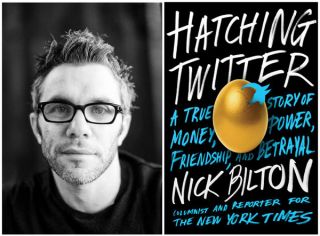
Nick Bilton "Hatching Twitter"
So the first mobile phones had a text messaging avenue open, but the phone companies had no idea anyone would want to do that, they didn’t even include it. And then later on, they experimentally included this ability to send these little text messages, and young people figured out they could actually have extremely complicated conversations and forms of communication can emerge, and forms of ambient co-presence can emerge with these tiny short little messages. And now before you know it phone companies are doing more business in text messaging than they are doing in voice calls. So the young do have an edge in experimentation, and this is crucial for new technologies because nobody really knows what they’re good for, including and perhaps most importantly the people who created them. One of the reasons why Twitter has worked reasonably well up until now is they have followed their users rather than led their users. They started off with something that was really simple, it was just sending these little messages back and forth. But they originally thought of it, and you can see this if you read Nick Bilton’s terrific new book on Twitter (Hatching Twitter), as kind of these status update things, it was only later on that they realized people actually want to talk to each other. So Twitter found out they were a conversational tool. And then someone finds out they want to have a conversation about a specific topic and people might just want to stumble upon it so they do a hash tag. And then Twitter realizes they are a floating conversation so they add that in. So the reason they stayed on top of it is because they followed what the experimental people did. So experimentation is an important thing, but not only the young experiment.
Secondly, when Gibson said that the future is here but it’s not evenly distributed, I read that more as it’s not very economically distributed, because a lot of the tools that come along at first are expensive and it takes a while for them to circulate out. People look at things like iPads and think it’s a toy for the rich, or they looked at mobile phones and thought they were toys for the rich. Truthfully when people looked at the emergence of writing, it was a toy for the rich, which is to say the first people that did any writing at all were business people, Mesopotamian merchants who basically decided they needed a way to record how many sheep they had for the purposes of inventory and trading and needed some kind of marking system to do this. So going back to the absolute origins of human communication, our new media tools virtually always begin in the world of commerce and the elite and then trickle down to the mass. And as the mass gets ahold of it, they do really really weird things that you would never could see coming by just studying the elites. We could say that Gibson is a little inaccurate because when the future isn’t evenly distributed, it really isn’t the future. Because the things the few early adopters of the technology do with it are often completely different from what 50 million people do when they get their hands on it.
That’s basically why I never try to predict the future. So people ask me, “Clive, what do you think is coming?” and I tell them I have no idea and I’m not even going to try to predict. For a couple reasons. One, it’s an intellectually bankrupt thing to do. No one is going to ever check to make sure you are correct and you’re probably going to be wrong. The interesting thing I found is that if you wait for 50 million people to do something then you don’t have to try to guess it, you can just go out and report it. You can actually discover what they’re really doing by talking to them. So I didn’t write about Facebook until it was two years in the mainstream, I didn’t write about Twitter until it was well into the mainstream. And one of the upsides of this is you no longer have to guess what people are going to do, you just go out there and observe them and talk to them and report them and you actually have hard reality. So the problem is that if you try to do this sort of “future spotting” by looking at early adopters, you may find that what they do may have nothing in common with the really weird stuff that like a billion people will do when they get their hands on it.
Knowing When To Use “Fast” Versus “Slow” Technologies
You write: “One of the great challenges of today’s digital thinking tools is knowing when not to use them and when to rely on the powers of older and slower technologies, like paper and books.” You clearly appreciate books and history, as you cite heavily from these historical sources and have been writing magazine articles for 15 years. Yet this is because you grew up in a time where it was normal to read a physical book. If new generations no longer use physical books, will they lose the opportunity and power that these “slower technologies” afford?
If all book reading vanished, then absolutely, we would lose the modes of thought that come—spending hours and hours or even days—following one argument or one story. And there are clear powerful mental and spiritual benefits from engaging in that type of thinking. Do I actually think books are going to die? No I don’t think so. And most of the scholars of literacy that I’ve talked to don’t think so either. If anything, at the moment, it appears as though the internet is having some good effects in resuscitating book reading from the real technology that was most threatening to it in the history of the book, which was cable television. If you take a look at reading rates, really the problems begin with the advent of easy on demand TV because it didn’t require any work or require you to do any writing, and was pretty ubiquitous. And one of the interesting things I discovered is that it’s very hard to discover exactly how much reading is going on, and whether it is a lot less, or equal, or more than in the past, because when people ask about reading and how much you’ve been reading they have different ways of asking the question. They’ll say things like “Are you reading a book right now?” or “Were you reading a book yesterday?” or “How many books have you read in the last year?” And depending upon how you ask that you get quite different answers out of people. So the data are muddy over the last century. I have read work that suggests the amount of reading has by and large remained pretty stable over the last century. I have read studies that suggest it has gone down precipitously. I have read studies that suggest it has gone up. I wish I knew what was definitively true.

Al Purdy
Probably the best data that we have might be stuff that Wendy Griswold has looked at—she’s a scholar of what she calls the “reading culture” which is the subset of people that do deep reading. The people who are the real readers, they read a lot, they rely on books heavily to scaffold their thinking. They were always a minority of the population. She suspects it has contracted a bit in the TV period, as TV doesn’t correlate very well with reading. But she thinks the internet actually correlates very well with reading because it reduces intellectual isolation. If you are part of the reading culture what you really want are people who can talk about the books that you’ve been reading. Well, that used to be a little hard to do. I’m pretty obsessed with Canadian poetry because I’m Canadian and I work for the league of Canadian poets. That organization actually exists. I organize poetry readings. But I live here in Brooklyn, and it’s a very literate part of the world. How many people do you think I can find in my neighborhood to talk about Canadian poetry? That’s right, zero, none! Even the Canadians here don’t read Canadian poetry. But online I can find all sorts of people. Just the other week I Tweeted three lines of an Al Purdy poem and within minutes I had five or six people and we were all talking Al Purdy trading videos of his readings back and forth. So the internet reduces the intellectual isolation of the reading class. This is why Wendy Griswold has basically found that it appears to have a really terrific impact on the reading habits of the reading class. Things like Goodreads allow people to really get deeply into it. I also asked her “So what about the next generation? Is the reading class going to continue?” And she said yeah. She’s not just a historian; she does ethnographic research and travels all around the world, and wherever she goes she hangs out with young people. And she said there is always that minority of kids that for whatever reason, maybe they are trying to be impressive to adults or to themselves, they take reading seriously, they read a lot, they’re as wired as the other kids are and are using Facebook, text messaging, but they just make it a practice in their lives to read lots of books. And she thinks there is no indication that this is going to die out. So I don’t actually think the reading of books is going to die, and the young appear to be increasing the rate at which they read faster than adults.
National Endowment for the Arts has been doing this study every year for the last three or four decades, where they would basically go and do the same standardized questions about how people read. And they were asking specifically about literate reading, which includes novels, poetry, plays, not even including non-fiction, so the really literary stuff. Are people still reading that stuff? Well, all throughout the TV years it was going down, down, down, and the reports had increasingly morose sounding titles. “Reading at risk” was the big one from I think 2002, they were just like wow we are really in trouble, people are reading less and less. And then about a decade later there was this report called “Reading on the rise.” For the first time in like three decades they had detected literary reading going back up again, and the really fascinating thing was the single biggest leap which was dragging the results up for everyone else was among young people, because there was an explosion of these serialized huge books like Harry Potter, or the Twilight series, and Percy Jackson. Someone calculated this on McSweeny’s, that the number of pages in the Harry Potter series was something like five or six thousand pages of reading! It’s like reading War and Peace three times—of course War and Peace is more challenging—but in terms of getting your sense of self as a reader, I think it would be bad if we lost that culture, but I don’t think we are going to lose it.
I wonder to what extent internet reading is at a lower level than in the past?
If anything there is tons more reading happening now than ever before, it’s just different and weirder reading, right? If you’re online, you’re constantly imbibing text, text, text, in a way you never did before. It’s sort of what the linguist Naomi Baron—who wrote a wonderful book Always On—said in that it’s kind of in between “printish” culture and “speechish” culture. It has some of the casualness of speech but some of the formality of writing.
Are Brain Games Bogus When It Comes To Raising Smarts?
You compare “pleasant but probably useless brain fitness video games” to “corporate snake oil.” In fact, there is little to no evidence supporting the idea that brain fitness games (e.g., Lumosity) actually improve intelligence or other brain attributes. Do you think people actually believe these games will make them smarter? Or are Brain Games Bogus as Gareth Cook has pointed out?
Well they’re definitely pleasant but bogus. I do think in a way at least some people think they are doing good things for their brains, because there has been this wave of health concern about memory frailty as the boomers are getting older. And Alzheimer’s has become this sort of terrifying disease in the way Consumption was this terrifying disease in the nineteenth century. Because we’ve grown more aware of thinking work in everyday life, we are more terrified of the idea that our minds might go. And also people are just living longer, right, so the prospect of living into your eighties but having your mind be in the throes of dementia is understandably frightening to people. Pushed by those forces people definitely hope these tools will improve their brains, but they probably won’t. Reading widely, having a lot of conversations, getting a lot of exercise, eating a healthy diet, these things will help preserve your brain more than playing a brain training video game. To the extent that anything works, and we know that social contact is very powerful.
It seems that people generally like the idea of a quick fix.
As snake oil goes, it’s not that bad. It’s not harmful. I mean, there are supplements that are sold over the internet that are actively dangerous. At least if you enjoy the brain training games, there’s no harm really, maybe there will be a placebo effect, you know, which can be quite powerful.
90 Percent Of Everything—Even Internet Writing—Is Crap?
You discuss how trillions of words are put out by ordinary folks on the internet, quoting Theodore Sturgeon saying “Ninety percent of everything is crap.” Om Malik wrote that “The biggest fallacy of writing on the web is the idea that there is unlimited space, and as such limitation of space is of no consequence. That is not quite true. Instead of space, the true limitation of the Internet is attention.” He went on to say that the creativity lies in how you clearly and concisely convey your ideas. What do you think?
Yeah, I absolutely think that writing concisely and pithily is more recognized as a value now than it has in some time. We have some tools now that encourage pithiness, for example Twitter. People mocked Twitter for “what can you really say in 140 characters?” but I think what we’ve discovered is that people can say delightful things, it forces them to boil what they want to say down to the absolute nut of it, it forces them to be incredibly witty. As Shakespeare wrote, “brevity is the soul of wit.” An aphorism itself that would fit perfectly into a Tweet with room left over. At the same time Om is wrong in that there really is infinite space online and that is one of the intellectually delightful parts of it. I’ve been happy to see the rise of often average people doing extremely long form writing too.
Is it good writing?
Often it’s fantastic. Of course it’s easy to see bad stuff. Again Sturgeon’s right a lot of it’s bad stuff. Here’s one of the problems. People tend to judge writing by going to a place where nobody is doing ay monitoring or filtration and then saying “wow, look at how bad things are.” And a prime example is newspaper comment threads that are rarely moderated. There’s no social control, which is because the newspaper wants volume so they can sell ads. Whereas whenever you go to a forum that has a specific goal of subgenre, and people are collected there because they’re all genuinely interested in talking about the same thing, you often see astoundingly high quality. For example, if you pick any TV show, then go to the fan site for that show after a particularly interesting episode and behold the tens of thousands of words of often extremely civil, polite, intellectually interesting, conversation that goes on for hours.

Sherlock
I was watching Sherlock. And at the end of the second season he appears to die, but in the final scene you find that he is still alive. My wife and I are going “Oh my god, how did that work?” So I immediately go to a big discussion forum, joined the conversation, this went on for hours, by the end of it I think there were like 34,000 words or so. People were incredibly smart, erudite, they were doing crazy stuff like going onto Google maps and taking street view snapshots of where it was shot so we could actually figure out how they did the shot. So it’s easy to see the corrosively dumb speech, because it mostly happens at these newspapers that have no interest in having any culture of civility. But I like to say that the dumb loud political speech is like the white matter of the universe. It’s the small part that you see but the dark matter is much more numerous. It’s the weird hobbies, the obsessions, that really dominate people’s speech. Or as I like to say, political speech is often terrible online but if it follows conversations of our offline conversation it’s very little of what we talk about. Robin Dunbar found that perhaps three percent of what people talked about was politics when face to face. If the same percentage holds online then sure we can go to a political site and find terrible discourse, but it’s probably a tiny chunk of what’s happening.
I talk about this in the book, there’s also the sense of what is the social architecture that produces better speech? Well it tends to be when there is someone in there socially managing the conversation. When there’s someone encouraging the good speakers, and discouraging or banning the bad speakers to avoid the hate speech and trolling that’s often aimed at women and minorities. Often it’s in a non-corporate setting, because they have trouble committing a lot of resources to this. So we are learning when there is a system that puts good quality stuff at the top so people encounter good quality conversation right away. These kinds of rules of conduct are increasingly becoming better known. Whenever you see bad speech online, it is usually because they are violating, ignoring, or unaware of those rules of conduct.
Are We Trading Some Literacies For Others?
Andrea Lunsford said “I think we are in the midst of a literacy revolution the likes of which we have not seen since Greek civilization.” Yet E.D. Hirsch has discussed cultural literacy, the idea that you need a certain amount of general knowledge about history and culture in order to be a fully functioning citizen. You also wrote: “We’ve long struggled, as a culture, to pay attention to the past. It’s probably harder now than ever.” To me, Lunsford’s statement rings somewhat hollow. Do you think as our tools change from generation to generation, we are trading one literacy for another? What are the consequences, if any?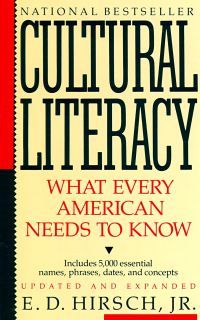

Andrea Lunsford said “I think we are in the midst of a literacy revolution the likes of which we have not seen since Greek civilization.” Yet E.D. Hirsch has discussed cultural literacy, the idea that you need a certain amount of general knowledge about history and culture in order to be a fully functioning citizen. You also wrote: “We’ve long struggled, as a culture, to pay attention to the past. It’s probably harder now than ever.” To me, Lunsford’s statement rings somewhat hollow. Do you think as our tools change from generation to generation, we are trading one literacy for another? What are the consequences, if any?
Well what we’re really talking about here is the question of canon. We get people to have a shared canon so that they can talk about things, right? This is not a new dilemma. We’ve had this problem for centuries. It’s a problem you encounter in pluralistic societies. We’ve got immigrants coming in, how do we get them to care about the same things we who have been living here for a long time care about. It’s the anxieties you get in literary culture, how do we get people to care about the books they cared about a hundred years ago? It’s a political issue, how do we get people to pay attention to politics and foreign politics so that we can be confident they will vote in a smart way? The challenges now are probably similar to the challenges in the late nineteenth century when you had a large degree of pluralism in publications. New York City had many many newspapers back then. You picked your newspaper based on the union you belonged to or the neighborhood you lived in or the ethnic group you belonged to. And people read voraciously from a bunch of different sources but they had stuff catered to them. And then we had this weird period in the middle of the twentieth century when there was a much more constrained mass market. And people often longingly look back at that and say the nation was united around thinking about the same three or four things. There is some truth to that.
But that narrow conversation elided a lot of stuff, it took second wave feminism decades to convince the mainstream media about the stuff that women were living with and “women’s issues” that this ought to be part of the canon. Canons are great because they focus our minds so we can talk about the same thing. But they also limit and force things out and they do that in ways that are fairly delineated by power. So I take seriously the idea that if you’re going to have a society then you have to have people focused on a certain number of issues on what they need to think about. But I think that challenge has been with us for an amazingly long time, and one of the ways we have dealt with it, frankly, is through education. That is where we begin with canon, that is where we begin with citizenship, that is where we begin with establishing the base of knowledge that we expect a citizen to have to participate. Once you’re an adult it’s a lot harder to tell you what to think about.
I’m old enough to have lived through the period when presumably the nation was unified around caring about three or four big issues, and I can tell you I didn’t care about any of them at the time. I was obsessed with my own small niche things. I think what’s happening now with the internet is cultural elites—and I would probably include myself in that category because I’m a New York writer—are startled to discover just how diverse human interest and human passions really are. Because when you live in one of these cities on the coast, you think wow, everyone is really unified around X, Y, or Zed, because we’re writing about it. But then you discover, no, no, no, people don’t care about that at all!
I’ll give you a good example of this. So back in the nineties Nielsen started doing something called sound scan, where they collected data on every single album being sold at the moment it was sold, so they knew which records were selling. Up until then, top 40 Billboard lists were based on polling a bunch of record stores and asking them “what’s selling?” They would pick a lot of record stores that sold a lot of rock and indie pop because that’s what people running Billboard cared about, but it wasn’t necessarily representative. So now sound scan comes out with data on what people were actually buying and overnight it becomes obvious that what the country listens to is hip hop and country in vast quantities that massively outstrip any other stuff like alternative rock. The same thing happened with books ten years later. Book scan comes along to see what books people are actually reading, and once again, the New York Times doesn’t put together its bestseller list based on what books are actually selling, they put it together based on a handful of carefully picked bookstores in elite markets because that’s who they care about—“thought leaders” to use one of the most obnoxious phrases coined in the last ten years. Thought leaders. So it turns out the country buys a million-gazillion Christian books and a lot of self-help right?
So in each case, as soon as we got information about what the average person was really doing it didn’t in any way cohere with what the people—who thought they had a lock hold on canon—thought everyone should be talking about. And the internet has a little bit of that effect. Because it makes conversation visible it startles us with the diversity of what people actually care about. In many ways I think that’s a useful thing to have to confront, to be disabused of the idea that everyone is in lockstep behind a couple dozen self-appointed thought leaders, or what people on the coasts think they should be reading. I’m honestly starting to sound kind of obnoxious here, I should shut up. I don’t take lightly, and I agree with the problem that if you’re going to have a society you have to have people focused on certain important issues, but we’ve had that difficulty for a very long time. I’m not sure it is catastrophically worse than it has been in times of the past.
Well in terms of cultural literacy, you clearly have an appreciation of history as you read stuff from Project Gutenberg regularly, so I’m not sure how many people actually read that part of the internet.
Almost none of them. But almost none of the adults around me do either. This is why only a small fragment of people ever go on to university or advanced study. If you really want to have a more literate culture you really have to begin at the level of education. As a Canadian I’m simply barking mad over how ridiculously expensive education is in this country. You’re going to kill off anyone who wants to study literature, or philosophy, or history, as a line of study because when it costs you $45,000 a year in tuition it makes absolutely no sense to do that. Now I went to college and it cost $1,200 a year in 1987 in Canada. So of course I’m going to study Canadian poetry because why not? Not that much money is on the line. And I wind up with a really terrific liberal arts education which ends up being incredibly valuable and useful when I go on to study technology because a lot of this historical knowledge helps me understand what’s going on around me. So I can absolutely make the argument for a good liberal arts education, but those arguments crumble in the face of $45,000 a year tuition. Or as I like to say, if we’re worried about the state of curiosity and inquiry in this country, we have to begin with the huge institutional forces that shut it down and that is the household-breaking cost of higher education.
And just getting a job after you graduate, right?
Yeah, and having a job that doesn’t require you to work ninety hours a week. You want people to read books? Let them work a reasonable work week! And have a pension so they can retire and read even more. The reason why all those old people read those books is because they’ve got that time free, because they’re not working at Wal Mart to pay for their retirement.
Going back to whether we are trading one literacy for another, what do you think?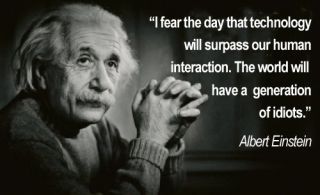

Going back to whether we are trading one literacy for another, what do you think?
At the moment I would say I don’t think most of the new literacies are replacing the old ones, as much as supplementing them. Now that might change as time goes on. Someone made a joke about how in the Star Wars movies you never see anyone reading anything. The computers are always talking to the people, and they’re talking back, and I’m wondering is this the literacy collapse when you develop computers that can talk to you? Do you stop reading and typing? Nowhere in any of the Star Wars movies do you see anyone quoting someone they have read, or actually reading a book.
Right now I think what’s happening is our oldest literacy, which is text, is still probably growing. The amount of writing we do now is huger than it’s ever been in history. I calculated something like 3.6 billion words a day, which is insanely high, and that’s a lowball estimate. No one could give me an estimate for discussion boards. Pick your hobby: baseball, guitars, knitting, there are half a million people in the knitting board group alone, God knows how much they produce in a day. So our use of text has absolutely exploded in the last ten years. The new literacies have come along, using video to communicate, using data, audio, pictures, but I don’t think they have displaced text at all. If you talk to literacy scholars, they’ll tell you all of our education is still firmly rooted in text, as it should be. It’s our most flexible for setting down our ideas and communicating. I think the new literacies will take decades to emerge in ways we don’t expect and to mature.
I say in my book that a medium only becomes mature when we use it to talk to ourselves as much or more than we use it to talk to other people. So right now we take notes, we look at them, we organize our ideas before we communicate something. But with video we mostly use it to broadcast something, we don’t yet see it as a way to organize our thoughts, same with audio. Pictures we’re a little closer to approaching that textual-self conversation, because people take pictures just to look at for themselves. Part of this is technological as we don’t really have a way yet to search photos and videos, so we can’t use it as a mode for parsing, reflecting, and recalling ideas. I think we’re a long way off for anything that would seriously chip away at text. Of course I could be wrong, there are people that think it’s all over, but right now I think it’s currently exploding.
Are We Losing Older And Perhaps Wiser Ways Of Innovating?
You write that “before the word processor went mainstream in the 1980s, professionally editing text—moving ideas around, sorting your thoughts—was a surprisingly cumbersome chore. Cutting and pasting was not metaphoric but literal…That glacial pace had its advantages. There was a meditative quality to shuffling the scraps around, as various gray-haired newspaper editors, hovering over the edges of their retirements, informed me when I became a copy-editing newspaper intern in 1994.” This is actually the way I was trained in data analysis and writing, in this old-school method, but in academia rather than journalism. And although I found it frustrating and boring at times, I now look back and realize that a good idea took a long time to come about. You wrote: “Slowing down also gives you time to consult a ton of sources and intuit hopefully interesting connections between them.” Do you think some very useful skills and ways of innovating will be lost due to our adoption of new tools? If we are not forced to slow down due to lack of technology, how can we force ourselves to slow down?
This is a very good question. There’s a big piece in The Atlantic Monthly by Nicholas Carr looking at automation. If you automate skills that shouldn’t be automated you can degrade the quality of your performance and thought. So we have Google self-driving cars coming along. On the one hand this is great because humans are dreadful at driving. We should not be driving. We have terrible wandering minds and are too easily distracted. We are overly confident in our abilities and have a dreadful sensual appreciation for the kinetic power of a two ton object moving at sixty miles an hour. So I would way rather have a robot controlling the car. The danger of this, and I’ve been talking about this with the science writer Bianca Bosker for The Huffington Post who wrote a great story about this, is when you have to suddenly hand the control back to a human.

So I’m in the car and sleeping, playing a video game, or not paying attention, or reading a newspaper, and suddenly my self-driving car goes “Oh my God, something is happening that I can’t handle” and says “Here Clive, you drive.” And maybe I haven’t actually driven the car for two years now. So I’m probably going to be a disastrously bad driver. So if you hand off to a machine or an algorithm, you can lose the habit of doing that task. This is a really interesting problem and I don’t know how they’re going to get around that with self-driving cars. The statistical answer is if I am handed back the car I likely will crash it, but the overall damage rate of handing off the control of cars to robots will still be so much lower so it’s worth it overall.
So how does this analogize to cognitive tasks that aren’t so life and death? One example is with calculators and learning math. The evidence seems to show that if you give a kid a calculator too early a stage in their learning they won’t learn it quite as well because they don’t get the chance to really wrestle with those procedures internally. It’s even bad to routinize or hand over to an algorithm the act of addition with carrying. Add one number, carry it over, that’s an algorithm for adding. Studies show it prevents the kid from thinking about what the numbers mean. So if you take kids who were trained in the algorithm of carrying, and others who were told to think of how to add them up yourself, studies show that the kids with the algorithm get it right most of the time but when they get it wrong they get it unbelievably wrong. They’re not thinking about the numbers, they’re using the routine. I see this in my kids learning, where teachers do teach the algorithm but they also teach different ways to think about the numbers, where they give homework and tell the kids they can’t use the algorithm but need to find another way to do this. Studies also show that once you’ve grasped these basic math concepts, using a calculator is fine and this actually improves their ability to learn math, discover more playful combinations of numbers, and ratchet themselves ahead.
So there is some inflection point in our human abilities where we need to have a human grasp of the principles, and beyond that machine assistance is a good thing. So when you think about your experience, the question becomes what was it about the slowness of the process of gathering the data was the crucial part of you thinking about what the statistical analysis meant, what the dataset meant. So while I completely agree the evidence shows there is this inflection point, it’s hard and context dependent to figure out where that point lies. We can say as a principle that in domains of human cognitive work you need to be able to grasp the basics of what’s going on and the principles before you algorithmically routinize it. But we’re also kind of crappy at figuring out where that point lies which is why you get disagreements which seem to fade over time as to whether or not particular machine assistance is useful or is going to be the death of us all.

A Slide Rule
As another example, there were heated arguments over the transition from slide rules to calculators. A slide rule has an analog nature to it that forces you to wrestle with almost the tactile nature of a logarithm. I used one a little bit, my dad gave me his, he was a civil engineer. They’re beautiful things, I’ve thought of collecting some because they look great on the wall. So they get you to wrestle with the physicality of math, which is really cool. But did the vanishing of the slide rule degrade overall science? The tradeoff is that we got much higher precision, because people made all sorts of mistakes with slide rules. But there were huge pronouncements of doom in this regard, that if you shifted over to calculators people would lose this sort of tactile relationship with math that would be the doom for physics, but this didn’t really seem to happen. So what I’m giving you is an answer without any real guidance. So yes, we do need people to be intellectually trained in the real roots of whatever domain they’re working in, and there’s a danger of adopting assistive technologies too early on, but it’s very case by case and it’s hard to extract a principle.
For example, there’s been this concern that Google maps are bad for people’s geographic knowledge because they’re not poring over maps anymore. And I’d love to see more work on this because my intuition in my own life is that it’s the opposite. Before the internet came along and Google maps I never looked at maps, I did when I drove somewhere about three times a year. Whereas now I think I look at maps probably twice a day. I have very good geographic knowledge of certain areas because I’ve looked on maps more than I ever have before. Having a resource immediately at hand can be enormously powerful. I have not done the research to determine whether Google maps has decreased people’s geographic knowledge overall, and I’d like to see work on that. And sometimes lab research doesn’t reflect what goes on in the real world.
So here’s another example to illustrate this. So Google comes along and is great in one sense in that it allows students to consult a way larger base of knowledge than they had in their crappy high school library. And speed is valuable because we know that left to our own devices we are fairly lazy. And we humans will prefer a fast and accurate incomplete answer to a complete slow one. Exhibit A: Encyclopedia Britannica, their studies found people looked at their encyclopedia once a year. You buy an encyclopedia, it costs you hundreds of dollars, and you look at once a year. Why? Because it is slow to use. So Google helps us find information on things we would have never bothered to look up. The downside is that college students, who have been tested on this, tend to trust what Google throws up as the first couple hits. This is not good literacy or critical thinking. A librarian told me that what she trains her students to do is to think like a reporter. When you’re doing internet research, you need to say “So I have the answer from this source here. Does this match the answers from several other sources that have competing motives?” And if it does, that is something we can take a bet on as established knowledge. So if I’m doing a science story and I get one thing from a scientist, well then I will bounce that off of another scientist they dislike. Students are not doing this with Google and are not being very critical consumers of it, and one of the things they need to disambiguate whether or not a web site is full of crap is a fairly broad based knowledge of the world already.
So this takes us back to the culture wars of the 1980’s, over what does cultural literacy mean? What should an American kid know getting out of high school? And Google actually makes broad based knowledge of the world more important, not less. You will only benefit of the knowledge thrown at you if you already have a good scaffolding of basic knowledge of the world in which to fit it into. So Google is great if you’re already reasonably educated. But if you’re not educated to that level it’s not going to be that useful for you. So that’s an example of an algorithm that is useful for people of a certain level of education. A lot of problems that lay at the hands of technology really are problems that lay at the hands of a state that has frankly lost its way in thinking about education. All these tools reward the already informed. They are just not as helpful to people who are incurious and have a bare level of education. Well this is a public policy problem, it always was.
I was just Tweeting today about the fact that in the U.S. they’ve developed a school funding system that is very local. And so if your neighborhood is very rich, your school has lots of money. If your neighborhood is poor your school doesn’t have much money. And that’s exactly what you wouldn’t want to have to level out education. Poor kids should have more resources and wealthy kids shouldn’t need as much and will be okay because they are going home to folks with books in the home and higher education degrees. Other countries federally fund their education more, so they can make sure the poor neighborhoods get enough education so they come out of school intelligent enough to use Google in an effective way. In the U.S., 18% of a schools funding is federally derived, whereas in the average industrialized country it’s 54%. So those countries have a much more equal starting line for education. Every time we talk about getting people to use digital tools correctly, you also have to talk about education and policy. And right now the U.S. has terrible policy regarding having students becoming intellectually equipped in their adult lives to handle our new cognitive environment.

Alexander Pope
I’m pretty optimistic about the adaptability of our thinking strategies. For example, I am a big marginalia taker in books. It’s how I make sense of a book. And you could say there’s a wonderful kinetic feeling to that and I write more slowly than I type, so am I encoding that knowledge in a better different way? And you can do these swoopy little cool connections where this part is connected to that part. And there’s this spatial memory about where it is in the pages, and that’s lost when you work digitally, right? But on the other hand, when I take notes on my Kindle, I can move a little more quickly when I’m typing so I put in a longer and more thoughtful idea, sometimes I’ll even write two paragraphs, which you can’t do in the margins in a book. And more importantly you can reencounter those notes by putting them into a database, and when I search them I can find notes that I had forgotten I had taken from a book three years ago. Recently I’ve been Tweeting couplets from Alexander Pope’s essay on man, because he’s one of my favorite poets, in the 18th century he’s my overall favorite poet, and I read it on the Kindle. So I kept on highlighting these wonderful couplets. And so I called up the notes and I’ve been Tweeting these couplets. And there’s no way in hell I would do this with my paper book. I would literally forget it was there. I do 50% of my notation in paper and 50% in Kindle and I don’t feel there is a big difference in the quality of my thinking, only that it’s easier to encounter what I wrote in the digital format. And that reencountering is so explosive in value.
I think a lot of it is just habits. It has a lot to do with what you’re comfortable with.
Yeah. And this is also why I tell people when they read my book who say they don’t like doing that: “Well then don’t do it!” If you have your intellectual habits worked out, and they work really well for you, don’t screw with them. If you want, experiment with something, figure out whether it might add something to what you’re doing.
Back to those old white haired journalists shuffling around scraps of paper and getting insights, is this similar to clearing out a digital space without distractions where you can really focus and work?
Well, no. Those guys who were working with those clippings, they were distracted as hell! They were working in a newsroom and the chaos in there is unbelievable. And everyone was talking out loud so they could all know what they were doing. I was talking more about what it meant to think about the shape of a piece, there was a structural value to breaking it up and visually seeing it that way and moving it around. You can tell it’s still valuable because there’s a lot of writers that still do that, they write their book basically on notecards, and they’ll put out like fifty cards out on the floor. I’ve never operated that way, but I respect that.
Are they older people?
Well there are people in their early 20’s. It’s all over the map. And I know older academics who have moved to a digital database for their notes years ago. This is why I think it is hard to be proscriptive with digital tools because our thinking processes are so idiosyncratic. So this is why people argue over which note taking program to use, such as Evernote. I think it is important to find a way to use whatever tools you use in a way to mindfully engage in whatever you are doing. For example, one danger I have learned to avoid with digital note taking is that you can over highlight and cut and paste. Well if you just cut and paste things, you’re not really thinking about them, you’re not harnessing what they call the generation effect, which is the idea that when you have to create something, you remember it and encode, and incorporate it into your knowledge better. And they’ve done studies showing this is true. So what I will do is highlight the section, but also write a note about it and express some thinking about it in my own words. Sometimes that note becomes more valuable than the actual passage I’ve highlighted. Any lazy approach to intellectual work will not render any great results. And I think the laziness, as you say, is in the habits you inculcate, and I’m not deterministic about these tools, I think they can be used in a plurality of ways. That’s why I don’t buy the idea that Google inherently makes you stupider in that regard.
How Will Our Google-Drenched World Affect Our Creativity?
“The subtler risk of living in our Google-drenched world may not be how it affects our factual knowledge. It’s how it affects our creativity. Sure, social knowledge is great. But many big strikes of creative insight really do require Thinker-style interiority, in which we quietly mull over material that we have deeply internalized.” And yet, “this technique works only if we’ve actually got a lot of knowledge about the problem stored in our brains through long study and focus.” So we essentially need knowledge at our mind’s fingertips, already mastered in our memory, is that right? What forms of creativity are we losing thanks to Google?
As I go on to say in that chapter I don’t really think we’ve lost much creativity. Because the stuff we’re creative about is the stuff that we’re obsessed with, which we do tend to keep in our minds. Passion is what drives memory. So we can now account for a more diverse array of information, and we can now have far more serendipitous encounters with knowledge and other people, that you probably get a net increase in creativity. But it is also true that if you want to have powerful creative leaps in the sense of going on a long walk and suddenly being hit by a bolt out of the blue, you have to deeply internalize knowledge. So it is incumbent upon the person who wants to be creative to really wrestle with the material they are thinking about. So you have to have those disconnected moments where you can think without being distracted. You also need to do more generation, such as writing about it, or writing it in front of other people. This is enormously powerful for encoding in our heads what we’re thinking about. The distraction stuff has made things harder, but the generation stuff has gotten easier. Even arguing about things through email has powerful effects in getting things to sink into your head. If we stopped lingering over the stuff that we cared about, you could argue that we are losing some creativity, but in practice I think when people are obsessed with something they do linger over it. So really what you have is a cultural problem. I would like people to be obsessed with space exploration more, with politics more, which is the age old question of “How do we get people passionate about the things that are the big things?” That’s what you and I are trying to do. We’re constantly trying to seduce people into thinking about science by posing it in a really delightful way. You attract more flies with honey.
You wrote in your book too that you want people to be passionate about everything, right? But I wonder if that’s really going to happen because people only have so much time, they have jobs.

You wrote in your book too that you want people to be passionate about everything, right? But I wonder if that’s really going to happen because people only have so much time, they have jobs.
Yeah, it’s probably not going to happen. It’s hard to be proscriptive, to say you should care about this. In a pluralistic society we discover that it’s good for people to care about stuff that I don’t care about. A society run by people like me would be dreadful! It would fall apart immediately. I think a society run by technology journalists would be awful. You heard it from me, basically.
One of the things I think is really unsettling about the internet and the way it has transformed society is how little people actually care about the things we thought they should care about. This is always what freaks out cultural elites. They thought everyone cares about the same five books they read. But they go online and everyone’s talking about Twilight, their fantasy sports league, Pokemon, their tea party meeting, gardening, and knitting. And the elites are like, “Oh my God, why is everyone so dumb?” And by dumb they meant why isn’t everyone reading the same five books I was reading.
Clive, you said that the internet has actually revealed how trivial we are, in a sense, right?
Trivial in the sense of the original meaning of the word—the news that arrived at the intersection of three roads—tri vial. I’m joking; I mean it in both ways. It both illustrates that our chit chat is silly because it always was silly, but also shows how bewilderingly vast the passions of the public are. So I didn’t watch TV during the 1990’s and when people talk about the show Friends I’ve never seen the show so I can’t talk with them about it. I’ve never seen The Simpsons. But nothing bothers me more than the pundits that talk about “the culture” as if there was such a thing as “the culture.” I remember I calculated there were more people playing Counterstrike online than there were watching Friends. There are more people playing Halo or Call of Duty right now than watching any individual TV show.
Does The Flynn Effect (Rise In IQ) Mean We Are Actually Getting Smarter?
Some of my research suggests that the Flynn effect, or the rise in IQ scores across the past several decades, occurs even among the top 5% of brains, and that the smart may even be getting smarter. Although there are likely many factors at work, and it is unclear whether these IQ gains are real intelligence gains, certainly the way we think is changing. Do you think new tools will only serve to make us smarter?
Well I don’t particularly buy the idea that IQ tests are indicative of what you might call smarts. I think the Flynn effect may be that we have an educational system that is good at training people how to take tests. I sponsor the idea, as Flynn does, that we now have a society that rewards ways of thinking that are less common than in times past. And you can see this in Andrea Lunsford’s study of freshman comp essays. So when they go to college, freshmen have to write a comp essay, it has been a standard of colleges for some hundred odd years. You’re getting a metric of what kids can do right out of high school year after year. Do they make errors of grammar, spelling, and language at the same rate over time? Have they gotten worse, have they gotten better? So what she finds is the overall error rate is basically unchanged over a hundred years. The type of error slightly changes. You get less misspellings, and more wrong word usage, which is what you’d predict with the advent of spellcheck. Spellcheck prevents you from misspelling, but also uses autocorrect to suggest a completely different word that it spells correctly. So you can see the mark of their reliance on that particular type of outsourced intelligence.

A Quill
But the thing that she didn’t expect but does change is that the essays over this time period get six to ten times longer and way more complex. So a hundred years ago a freshman comp essay is just a paragraph, such as here is what I did over summer vacation, here’s a description of a flower. What they are now is they are an argument. I’m going to make this argument, here is the evidence, and make a conclusion based on this. This is worlds more intellectually more sophisticated. I think this is the stuff Flynn is talking about, that the types of thinking we are routinely asked to do are much more complicated. So I think some of it is rising educational standards, and some of it is technology, because people forget that a hundred years ago it was really slow and hard to write. If you traveled back in time and took one of those ink pens in a quill and tried to write, you’re scraping a razor across paper and you have to start all over again. Or it makes a big blot and you have to blot it all out. Writing was a slow arduous process. It was so arduous that news people the 1940’s and 1950’s were so pissed off that they started working on ball point pens. And so this Hungarian newspaper journalist finally figures out the secret to making a ball point pen and the ink has to be a certain thickness and consistency so when the ball is rolling it doesn’t come flooding out the bottom. He make the world’s first fully functioning ball point pen, it goes on sale in 1945 in New York for the equivalent of $90 in current money per pen. They are enthusiastically bought by businesspeople. It’s the iPad of 1945. Why? Because of something known as transcription fluency. When the speed at which you are having your thoughts and utterances can’t be matched by the speed at which you write, you might have an idea or way of saying something that never comes back. So transcriptional fluency is important when taking notes, and things like that.
You can see as technologies for composition has improved over the last hundred years, that’s one of those things that’s causing the explosion in the length of the essays. It’s simply easier to get the words out. It’s also easier to do research. We have more books, we have more libraries, they grow over the twentieth century. Then we started having computers, and then in the last ten years the internet. So all these things combine together in these very subtle ways to produce an explosion in the length and sophistication in freshman comp essays. That is a type of a Flynn effect. Would that show up in IQ tests? Would I care if it showed up in IQ tests? Not really. I care about whether people are able to write at length a real argument. I do think that given an adequately educated public, these technologies do by and large have a track record of making us smarter and smarter as time goes on. Will they continue to do so? Well that partly depends on the educational component. We have not been doing a bang up job of it in the last ten years in the U.S. The rest of the world is leaving our country behind in preparing its young citizens to use this stuff. It would be interesting to see what Flynn thinks about that. One thing in my book is that I never really come out and define what smart means.
Yeah I know you probably would have a different definition than what I would say.
Truthfully I’m not even sure I have a good definition. I think one of my failings in communicating on this is that I suppose if I tried to write it out I would come up with a definition, but I don’t follow the cognitive science categories, although I initially thought of organizing the book that way.
I’m glad you didn’t do that. The book might have been boring.
It would have been incredibly boring! I decided I would sacrifice some of the precision so it would allow me to use the stories and the reporting. But this is where one can have a really interesting conversation that is based on this Flynn effect, essentially what does it mean to be smart? This is a cultural argument. This is what raged in the 1980’s when you had the guy who wrote the dictionary of cultural literacy. Poststructuralist thought had pointed out that the Western canon had assembled itself by systematically ignoring other histories, literatures, and ideas. And you can see this in the tools we use. For example, the Dewey Decimal system has one hundred subcategories for religion eighty of which were taken up by Christianity. So Western libraries have a systemic bias towards cataloging texts about Christianity, with very little sophistication and granularity for sorting and organizing knowledge about Islam, Buddhism, Sikh religious thought, or Judaism. So canon is all about a power struggle. So in the 1980’s we had the argument that you had to include more writing that had been thrown off the table by women, by suppressed minorities, and there was a panic about what there should be a cultural consensus on, what it means to be an educated person.
We have the same arguments about what it means to be smart, and one of the things my book tries to do is a huge amount of what we typically think of as intellectual work has always been very social and transactional with other people. And we’re too frequently defining intelligence and thinking as sitting and peering at a book alone for ten hours or ten years. And while that’s an undoubtedly powerful mode of thought, in the real world a huge amount of thinking happens when we’re arguing, bickering, and relying on each other and working in groups. And one of the reasons this has been denigrated is because socializing has been read as feminine—social skills and EQ. And you see this right now. All the sort of big thinkers out there complaining that social media is trivial and stupid are these middle aged male novelists, right? Jonathan Franzen, for example. They are literally saying, unless you are isolated, and remain isolated, somehow your thinking is contaminated and shallow and trivial.
I think it’s also their style. It’s probably their personality and the way they do things.
But as I like to say, let’s take any real world problem that needs solving. Say my plumbing falls apart, and I call a plumber. I don’t want him sitting there peering at a book, I want him exercising all these other forms of intelligence we have. Spatial thinking. His complex physical understanding of the real world, the fact that he talks all the time to the thirty other plumbers in his company, and the fact that he’s learned stuff in this classic oral knowledge. That there are all these other modes of thinking and learning out there. But we have this Rodin idea, that being alone is what counts as thinking. So the theme to my book is that that is not a complete definition of what thinking is. And that’s a clue to understanding the power of the connections that we have online. That’s a really interesting question about the Flynn effect.
Video Games Are The Gateway Drug To Learning
Halo You write: “I’ve played video games avidly for thirty years and am painfully aware how compulsive they can become. (I had to almost completely avoid my Xbox to get this book written.)” What are your favorite video games—past and present? How do you think gaming has influenced you? And how important is gaming for education and problem solving for our future?

Halo
You write: “I’ve played video games avidly for thirty years and am painfully aware how compulsive they can become. (I had to almost completely avoid my Xbox to get this book written.)” What are your favorite video games—past and present? How do you think gaming has influenced you? And how important is gaming for education and problem solving for our future?
I am embarrassingly not the type of person who likes the slow moving intellectual games like Civ III. I really wish I could say I love watching the complexity unfold, but I’m the kind of person that likes to get in there and wreak mayhem with some sort of Plasma gun and blow stuff up. I’m a first person shooter and a racing guy. Maybe this is just because I sit at a desk all day long and have a sedentary life. It’s a Walter Mitty thing. I have always loved the Burnout series of car racing games. And about seven years ago they had the epiphany to change the collisions into something interesting. When you have a collision, you’re trying to guide your car through the air to hit other things. I think I got addicted to Blur on the Xbox a couple years ago. Almost any of the first person shooters I tend to like, although I also feel morally queasy about how antiseptic they make war seem. This is why I prefer the Halo series where it’s not really real, it’s purely sci-fi stuff, and you’re killing weird aliens. I feel a little unsettled when I’m doing the realistic war games because I’m painfully aware that real war is not a joke. There’s a thing Lego internally calls the Lego rule in which they will only include weapons in their sets that are from the far past or the future. They do not include realistic modern weapons. You cannot buy a Lego figuring with a machine gun. They are making a statement that they do not want to joke about current forms of combat. So I’m sort of like that with my shooter games.
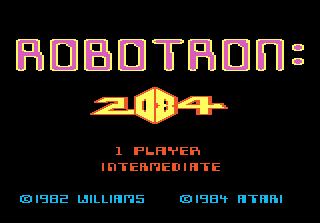
I’ve become a real fan of twitch games on the phone because I have two kids now but immersive games of the Xbox sort are best played in periods of four or more hours. They’re complicated so it takes you awhile to get into the problem space, figure out what it is you’re trying to do, and get better at it. If you play those kinds of games only 15 minutes at a time you get frustrated because you have to relearn each time what the game is trying to get you to do. Whereas the shorter games made for mobile phones are more like the arcade games from the eighties where you step up and play for like three minutes, it’s exhilarating, and then it’s over. Plants vs. Zombies is great and my kids like that one too, I’m playing Reaper which is this sword fighting game, I like Dots which is really frenetic. I constantly chew through games on my phone because they’re a buck or something like that. If I had to pick my favorite game of all time? Probably I would say it is Robotron 2084 from the arcades. It is such a phenomenal game, I love that the first two screens are pretty easy but by the third and fourth screen it’s throwing so much stuff at you that you feel you are absolutely at the limit of human endurance. And you can’t survive past ten screens. They made a version of it for the Xbox and PlayStation a few years ago, and I lost a lot of time playing that.
How has it influenced me? At a cultural level because I knew games were a huge deal for me and a lot of other people but they were not talked at all about by mainstream culture until recently, like five or six years ago. So I was painfully aware of something that I say in my book, which is that one of the reasons cultural elites are so disturbed by the internet is that they thought everyone was paying attention to the same stuff they were paying attention to. And they are alarmed to discover most people are not! But I could have told them that! Because back in the 1980’s and 1990’s the most culturally important thing to me was video games, and nobody wrote about them in an intelligent way in any newspaper or magazine on the planet. Full stop. They just wrote all these scare tactic articles about how all these kids were going to get turned into killers. We knew that from playing them this was not happening. We knew that the people who thought they had a finger on the pulse of culture were completely out of touch with what was actually going on in our lives.
I tend to view the internet as an opportunity to see all the weird stuff that people care about. I don’t have the reaction of “Why aren’t these people fascinated by the same stuff I’m fascinated about?” I became aware early on, that as Dave Weinberg says “everything is miscellaneous.” Whatever it is you care about, there are more people that don’t care about it than do. Your passions are someone else’s miscellaneous stuff. So playing video games was useful in learning cultural humbleness. The second thing is they got me interested in computers. They were a gateway drug to thinking about the role of computation in people’s lives. They got me interested in programming, which gave me a glimpse into the superstructure of software. And they’ve given me an enormous amount of existential joy, which I think doesn’t get talked much about. Since video games have been under assault for so long as a waste of time, people have had trouble expressing what it is that is joyful about them. And there have finally been a bunch of intellectuals who have begun to grapple about what’s good about games—not about what they teach you or if they improve your hand-eye coordination or working memory—they are asking as a philosophical enterprise what are they good for? Why do we love them?
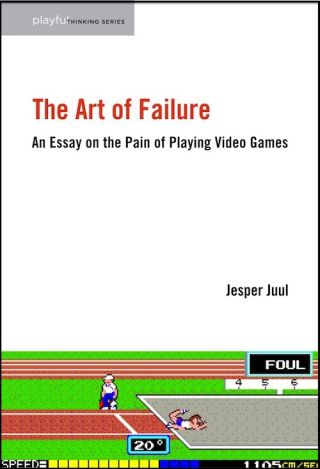
Jesper Juul wrote a wonderful book—The Art of Failure—talking about why is it when we fail and fail and fail and fail at games that we go back and do it again? There’s something weirdly pleasant in the experience of failing in a game. And this is an incredibly weird, paradoxically, counterintuitive, delightful thing. I think he’s right. Another is Greg Costikyan’s book Uncertainty In Games. Games are a way of confronting and meditating on the unknown. We enjoy the terror of uncertainty that comes with them. People say that they like a game because they want to be able to master it. True, but once we’ve mastered it we’re bored with the game, we move onto another one. We want the experience of uncertainty and weirdness that comes with that. So only now are we understanding there are these deep philosophical pleasures from games because it took kids growing up in the 1980’s to become senior scholars and thinkers and have the leeway to write about this stuff. I think Jane McGonigal’s book—Reality is Broken—the first third of it is an exploration of why we play games. And it is one of the best explorations ever of the deep emotional and philosophic joys of playing games.
Regarding gaming and problem solving. On the one hand you can have a perfectly great education without playing games at all. I think games are a fantastic opportunity for illustrating a couple things that educators often complain they have trouble getting kids to understand. One of them is the scientific method. We talk about how if you’re confronted with a problem to generate hypotheses and do an experiment to figure out whether your hypothesis matches reality. Collect your data, refine your hypothesis, and do it over and over and over again. And this is how we figured out gravity and all these different things. But it’s hard to get kids to really understand that because we give them these mock experiments to run where the results are already known because they are old experiments. We never give them a really invisible problem and ask them to make the rule set visible. We never tell them you need to figure out whether the Higgs-boson exists. They don’t have the tools to do that. We’re bad about giving them problems with invisible rules that they are excited about uncovering. And until you can do that, they’ll never really understand what is powerful about the scientific method.
Academics like Constance Steinkuehler have found that video games require teenagers to use the scientific method all the time. They approach a game and have no idea how this problem or this idea or this boss works, and so they have to go in and run experiments. I’m going to try and attack the boss this way. That didn’t work. Let me rehearse in my mind what I did and what I saw. Okay, I think it’s vulnerable in the left arm. That’s my hypothesis, I’m going to attack the left arm. Okay that didn’t work. Maybe I have to attack both arms at the same time. Okay, well they have this regenerating power when they spin around. New hypothesis, maybe prevent them from spinning around. Beating a boss in a video game requires you to use the scientific method, but no one calls it as such, and many teachers don’t recognize this, that this is a powerful way to illustrate to kids the scientific method. And it’s a great way to talk about the very rich and chewy nature of complex systems. What it means when you make one decision here that causes things to go haywire somewhere else.
I routinely talk to kids who have written 20,000 word walkthroughs of games, where they are essentially laying out everything they have learned about that game. This is easily a document ten times longer than anything they are asked to produce in high school, because they are motivated and they have an audience. And I think it is useful to use these things to teach them about how these tools are applicable to science and all aspects of life. Do I think you need to have this in your school? Probably not. Secondarily I’m a strong proponent of teaching kids a little bit of programming. And they all know games, so the easiest thing is to get them to program a game. And they will learn about complexity, and systemic thinking, logical thinking, and all this stuff that delightfully carries over for the rest of their lives even if they never become programmers. They will understand how software is designed and how that encodes a form of human intention. And that almost becomes a form of civics, right? Now you know when Facebook comes to you and says, “Hey dudes, now your photos are visible to everyone” if you know anything at all about programming you’ll understand that was an intentional decision on the part of Facebook to architect its environment and you’ll realize that it didn’t need to be that way.
And some teachers are doing some delightful stuff with this. Minecraft has become a really interesting gateway drug, because it’s not very violent and clearly like Lego, but it’s also a scripting language that lets you do things. I was talking to a teacher at a school here in New York with a kid in a biology class who is trying to model a simple cell using scripting in Minecraft. And this kid is just killing himself on this! He’s spending all his weekends trying to model a cell using Minecraft, because it’s fun, it’s creative and productive, and as Seymour Papert would say you get to show something real to other people. And that really motivates kids to work hard on stuff. So those are the types of cool things that you can do with games.
Is Music Connected To Writing?
The Delorean Sisters You told me you recently went to a wedding for one of your band members (Clive plays in the band The Delorean Sisters). So when did you start playing the guitar and harmonica?

The Delorean Sisters
You told me you recently went to a wedding for one of your band members (Clive plays in the band The Delorean Sisters). So when did you start playing the guitar and harmonica?
I can play a lot of stringed instruments. The one I’m best at is guitar. I can play the bass, the ukulele, mandolin, stuff like that. I played French horn for seven years in middle and high school, and I was very intense on it, I was studying with the first horn from the Toronto symphony. I was thinking of doing this full time and going to music school and I got a glimpse of what the professional life of classical music is like. But I decided that I didn’t think I had it in me and was that dedicated. So I loved playing music so I started playing guitar so I could play in bands. So I started playing in bands and was in this quite good band, we played original material and played in all these bars even though it was totally illegal, but that was Toronto back in the eighties. People asked me, “So do you want to music for a career?” And I looked at the music industry and said no way. People talk about the music industry falling part now but in the pre digital era it was a lottery system with poor ethics, if you can imagine that. So I decided I would do this on an amateur basis for the rest of my life.
So I became a journalist but kept playing, and I was working with a terrific singer/songwriter on a second album when I left for New York. Down here I didn’t do much for a long time until I moved to this neighborhood and the guy next door to me was Brian Braiker who at that time was working for Newsweek. He played the banjo. He comes over and we played together, and I realize he’s big into country and bluegrass. I’m not really a big country and bluegrass person myself, I mostly played like hard rock and folk rock. But back in 2003 or 2004 I had done this project with a friend who is a country singer, we had been just sitting around drinking at my place and I realized that “Just Can’t Get Enough” by Depeche Mode actually makes a pretty good country song when you play it on an acoustic guitar. So we got a lot of beer together and spent a few weekends where I would play all the instrumentation and and he would sing the songs and we would do country versions of the 1980’s songs. So we did “Here Comes The Rain Again,” Bowie’s “Modern Love” and Aha’s “Take On Me” but then my computer crashed and it all vanished. My friend left and moved to Florida.
So Brian and I were drinking at a bar nearby, and I was bitching that I hadn’t played live in like eight or nine years because I used to play live every two weeks for like a decade, and a woman friend was bitching about the same thing, so I said “We’re going to start a band right now,” I described the 1980’s thing and said “Let’s do this!” And they said “That sounds like fun!” So that was the beginning of The Delorean Sisters. We found two others and we started in the fall of 2011 and every couple weeks we play a gig somewhere in Brooklyn or New York or Jersey basically. And we’re working on recording an album right now so that’s fun. People love it so we’re enjoying it.
How do you think music is connected with writing for you, if at all?
In a really direct way. One of the things I talk about in my book is the need for what I playfully call cognitive diversity. If you buy the idea that the way we communicate and write, express, and form our ideas online is qualitatively different from the ways we do it offline, and that those are productively or usefully different from traditional less social thinking offline, then it’s still incredibly useful to read immersively for eight hours, go for a long walk, or just argue about something drunkenly at a bar with a friend. These things are sufficiently different from the ways we conduct ourselves online, and it will drag your mind in usefully different modes of thought.
The same type of thing of just doing something different with your body, the reason why we get ideas in the shower is because we’re not working and our bodies are doing something totally different, it’s a new stimulus environment, and the stuff we’ve been ruminating on just assembles itself in a completely different way in our subconscious. Say you go for a long walk, and that’s where the breakthrough idea comes through, or you drink something new. For a lot of people they like to exercise. So if you’re a person that works with words all day long like I do it’s really good to do something completely nonverbal in your spare time. I’m an instrumentalist, so I’ll play guitar for half an hour at the end of the day and it’s a fabulous way to put my brain in a totally different embodied state. I often come away from it having solved some sort of problem, and so it is a form of what I half-jokingly call cognitive diversity. And it is very emotionally valuable as well, which exercises whole other parts of my personality. Everyone’s got something like that, some people like to cook, they’ll spend eight hours on Sunday doing a fantastic Indian food dish, running, playing team sports. These are all things that are connected to the quality of our overall lives and thinking.
I think it’s good to spend significant chunks offline. For example, I don’t check my email on weekends. This means I’m usually off social media. But I’m not a monk about it, so if there’s an interesting story in the New York Times I want to share I’ll post it on Twitter and have a conversation about it. I’ll text a bunch because that’s social for me and how I organize social behavior. But I tend to get more reading done and my brain gets pulled in a cooler direction. And a lot of people tell me they can’t do that because their boss demands they check email all weekend. And this shows that a lot of the problems of distraction we have are not really latent in the technologies themselves, they’re latent in the power relations that emerge from those technologies. The labor of white collar workers is being squeezed in the way the labor of blue collar workers was squeezed back in the day that gave rise to unions, when they speeded up the assembly line to get more and more work out of people, demanding enormously long hours. White collar workers now probably need to have a solidarity movement that equals that because their labor is now constantly squeezed by employers who have the ability to reach them 24/7. The smart employers, although there aren’t very many of them, recognize that it’s actually bad for the caliber of their employee’s thought to be constantly pecked at like ducks all week long. And I think Volkswagen and a few other firms have instituted this policy of turning the Blackberry servers off after a certain hour at night and on the weekends, so there’s no email coming into their employees. To give them an actual weekend. And this should not be a revolutionary thought, this has been what the unions have been espousing for a hundred years, the weekend works. It’s a civic and social good and for a corporate employer it should be a corporate good too. Let people disconnect from your corporate demands.
Also see: Nine Ways To Become Smarter Than You Think
© 2013 by Jonathan Wai
You can follow me on Twitter, Facebook, or G+. For more of Finding the Next Einstein: Why Smart is Relative go here.




